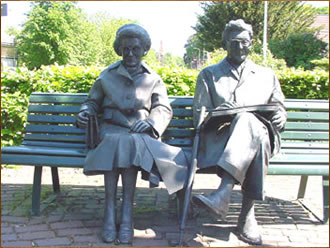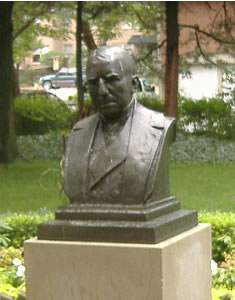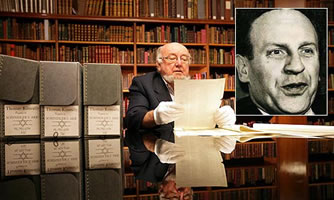|
De Nederlandse schrijver en dichter Simon Carmiggelt werd geboren op 7 oktober 1913 in Den Haag. Zie ook mijn blog van 7 oktober 2006 en mijn blog van 7 oktober 2007 en ook mijn blog van 7 maart 2008 en ook mijn blog van 7 oktober 2009.xml:namespace prefix = o ns = "urn:schemas-microsoft-com:office:office" />
Uit: Brieven aan Gerard Reve
20 mei 1971
Beste Gerard,
Deze brief, die antwoordt op de jouwe van 16 mei, begin ik met een visuele herinnering. Ik weet niet meer hoeveel jaar geleden. Maar je was pas tot het bewustzijn gekomen van je homofilie en er open voor uitgekomen in een publicatie.
Ik zat op een zomermiddag op een caféterras op het Kleine Gartmanplantsoen. Jij liep langs, met iemand. Je zag me niet. Je ging voor het Citytheater in de rij staan, naar ik meen om een film van Fellini te gaan zien. Ik keek naar je en dacht: Zijn motoriek is veranderd. Hij loopt en staat anders. Onbevangener, bevrijd. En je praatte met de persoon die je bij je had op een vrolijke manier, geheel ontspannen. Ik dacht: Hij is gelukkig, geloof ik. Wat fijn voor hem. En wat een ramp voor hem als schrijver en voor mij als lezer.
Dit is geen anecdote, maar wat mij betreft pure ernst. En misschien een bijdrage tot het probleem van je depressies. Iedere schrijver krijgt de depressies die hij verdient. Jij krijgt ze op jouw formaat. Maar als ze je niet verhinderen Gezond leven te schrijven, vormen ze, naar mijn mening, geen probleem van betekenis. Wel voor jou als particulier natuurlijk en voor je omgeving. Maar niet voor jou als schrijver en voor mij als lezer. Ik ben niet bezig je ergens van te overtuigen. Dat is natuurlijk onmogelijk. Maar ik betoog alleen, als lezer, dat je wanhoop en je vertwijfeling volstrekt onmisbaar zijn voor je werk. Als je, geheel bij wijze van spreken, een - uiteraard niet alcoholische - toverdrank innam, die je wensloos gelukkig maakt, zou je als schrijver sterven. Het valt te betwijfelen of je dan nog schrijven zou. Waarom? Gelukkige mensen hoeven dat niet. Maar als je het wel zou doen, wil ik het niet lezen. Wat heb ik aan de onbeduidende mededelingen van een gelukkig mens? Jouw hele werk drijft, tot zinken bereid, op de donkere onderstroom van je wanhoop. Haal je die eronderuit, dan blijft er niets over. Vandaar mijn vrees, toen ik je zag staan voor het Citytheater. Ik bedoel: onderwaardeer je wanhoop niet. Als je niet meer wanhoopt en je happy voelt, zal je stijl de spankracht verliezen, die deze stijl nu bezit. Particulier is het wel vervelend voor je - toegegeven. Maar wat betekent de particulariteit van een schrijver? Niets. Lezers zijn wreed. En Hemingway had gelijk, toen hij zei: Een schrijver kan niet met pensioen gaan en zich door zijn kop schoot toen hij dat laatste boek over Parijs niet uit zijn pen kon krijgen. Het is modieus het een rotboek te vinden. Dat is het niet, maar het staat beneden zijn peil. Maar als jij nu Gezond leven kunt schrijven, moet je de zelfmoord echt nog wel even uitstellen. Begrijp me wel: ik wil je niet, als humanist, tegen beter weten in leven houden. Ik praat als egoïstische lezer, die alles nog niet gehad heeft.
Maar die het wel allemaal hebben wil. Als jij voortijdig uitknijpt, besteel je me. Dat is een misdrijf. Zie de arresten van de Hoge Raad.

Simon Carmiggelt (7 oktober 1913 30 november 1987)
Carmiggelt met zijn vrouw Tini, brons van Wim Kuijl in Rheden
De Amerikaanse dichter en schrijver James Whitcomb Riley werd geboren op 7 oktober 1849 in Greenfield, Indiana. Zie ook mijn blog van 7 oktober 2006 en ook mijn blog van 7 maart 2008 en ook mijn blog van 7 oktober 2009.
Dead Leaves
Dawn
As though a gipsy maiden with dim look,
Sat crooning by the roadside of the year,
So, Autumn, in thy strangeness, thou art here
To read dark fortunes for us from the book
Of fate; thou flingest in the crinkled brook
The trembling maple's gold, and frosty-clear
Thy mocking laughter thrills the atmosphere,
And drifting on its current calls the rook
To other lands. As one who wades, alone,
Deep in the dusk, and hears the minor talk
Of distant melody, and finds the tone,
In some wierd way compelling him to stalk
The paths of childhood over,--so I moan,
And like a troubled sleeper, groping, walk.
Dusk
The frightened herds of clouds across the sky
Trample the sunshine down, and chase the day
Into the dusky forest-lands of gray
And somber twilight. Far, and faint, and high
The wild goose trails his harrow, with a cry
Sad as the wail of some poor castaway
Who sees a vessel drifting far astray
Of his last hope, and lays him down to die.
The children, riotous from school, grow bold
And quarrel with the wind, whose angry gust
Plucks off the summer hat, and flaps the fold
Of many a crimson cloak, and twirls the dust
In spiral shapes grotesque, and dims the gold
Of gleaming tresses with the blur of rust.
Night
Funereal Darkness, drear and desolate,
Muffles the world. The moaning of the wind
Is piteous with sobs of saddest kind;
And laughter is a phantom at the gate
Of memory. The long-neglected grate
Within sprouts into flame and lights the mind
With hopes and wishes long ago refined
To ashes,--long departed friends await
Our words of welcome: and our lips are dumb
And powerless to greet the ones that press
Old kisses there. The baby beats its drum,
And fancy marches to the dear caress
Of mother-arms, and all the gleeful hum
Of home intrudes upon our loneliness.

James Whitcomb Riley (7 oktober 1849 22 juli 1916)
Buste van Riley in Indianapolis
De Australische schrijver Thomas Keneally werd geboren op 7 oktober 1935 in Sydney. Zie ook mijn blog van 7 maart 2008 en ook mijn blog van 7 oktober 2009.
Uit: Schindler's List
The family Schindler was Catholic. So too was the family of young Amon Goeth, by this time also completing the Science Course and sitting for the Matura examinations in Vienna.
Oskar's mother, Louisa, practiced her faith with energy, her clothes redolent all Sunday of the incense burned in clouds at High Mass in the Church of St. Maurice. Hans Schindler was the sort of husband who drives a woman to religion. He liked cognac; he liked coffeehouses. A redolence of brandy-warm breath, good tobacco, and confirmed earthiness came from the direction of that good monarchist, Mr. Hans Schindler.
The family lived in a modern villa, set in its own gardens, across the city from the industrial section. There were two children, Oskar and his sister, Elfriede. But there are not witnesses left to the dynamics of that household, except in the most general terms. We know, for example, that it distressed Frau Schindler that her son, like his father, was a negligent Catholic.
But it cannot have been too bitter a household. From the little that Oskar would say of his childhood, there was no darkness there. Sunlight shines among the fir trees in the garden. There are ripe plums in the corner of those early summers. If he spends a part of some June morning at Mass, he does not bring back to the villa much of a sense of sin. He runs his father's car out into the sun in front of the garage and begins tinkering inside its motor. Or else he sits on a side step of the house, filing away at the carburetor of the motorcycle he is building.
Oskar had a few middle-class Jewish friends, whose parents also sent them to the German grammar school. These children were not village Ashkenazimquirky, Yiddish-speaking, Orthodoxbut multilingual and not-so-ritual sons of Jewish businessmen. Across the Hana Plain and in the Beskidy Hills, Sigmund Freud had been born of just such a Jewish family, and that not so long before Hans Schindler himself was born to solid German stock in Zwittau.
Oskar's later history seems to call out for some set piece in his childhood. The young Oskar should defend some bullied Jewish boy on the way home from school. It is a safe bet it didn't happen, and we are happier not knowing, since the event would seem too pat. Besides, one Jewish child saved from a bloody nose proves nothing. For Himmler himself would complain, in a speech to one of his Einsatzgruppen, that every German had a Jewish friend. " 'The Jewish people are'going to be annihilated,' says every Party member. 'Sure, it's in our program: elimination of the Jews, annihilationwe'll take care of it.' And then they all come trudging, eighty million worthy Germans, and each one has his one decent Jew. Sure, the others are swine, but this one is an A-One Jew."

Thomas Keneally (Sydney, 7 oktober 1935)
Inzet Oskar Schindler
Zie voor nog meer schrijvers van de 7e oktober ook mijn vorige blog van vandaag.
|



